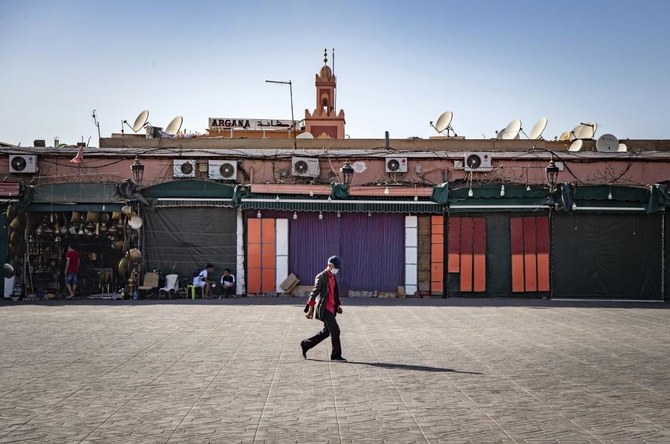RABAT: Morocco hopes to launch an ambitious vaccination campaign against the novel coronavirus by year-end, but its efforts have sparked suspicion and rumors in the country, hard-hit by the pandemic.
The North African kingdom is hoping to immunize 20 million adults against the Covid-19 illness within three months, using vaccinations from China’s Sinopharm and a UK-sourced shot developed by AstraZeneca and Oxford University.
Health Minister Khalid Ait Taleb told AFP that each country was free to “decree emergency use” of the vaccine of its choice.
Britain on Wednesday became the first country to approve Pfizer-BioNTech’s Covid-19 vaccine for general use, while the AstraZeneca/Oxford University shot is expected to come onstream soon.
The launch date for the campaign in Morocco “will depend on when the vaccines are certified for use but also on the delivery schedule,” Ait Taleb added.
But even before the campaign began, rumors pushed by skeptics have flooded social media, including a fake “draft law” stating that vaccination would be mandatory in Morocco, forcing the health ministry to issue a denial last month.
And this week, a photo of a young man being hauled away by six police officers, with the caption “official: vaccination campaign launched in Morocco,” was denounced as “fake news” by the Twitter account of the DGSN security service.
Morocco in August signed a deal to take part in clinical tests of a vaccine developed by Chinese company Sinopharm, which has agreed to provide the kingdom with 10 million doses before the end of the year if results are successful.
Even as they await preliminary results of phase three tests, the Moroccan authorities are preparing a “viral retaliation,” Ait Taleb said.
The novel coronavirus has battered Morocco, where daily detected cases are running at above 5,000 per day and recorded deaths from the virus have topped 5,900, in a country of 37 million.
The death rate has been relatively low at around 1.7 percent of recorded cases.
But in the port city of Casablanca, the beating heart of the Moroccan economy, under-staffed hospitals are close to bursting.
Hard-stretched medical staff, on the front lines of the pandemic since March, are showing signs of exhaustion.
But the government is hoping that by mobilizing 12,750 medics from the public and private sectors, military doctors and the Moroccan Red Crescent, it will be able to hit its target for vaccinations.
The first jabs will be reserved for “front line” staff in the health and security services as well as people in vital sectors such as transportation, and at-risk groups including over-65s and those with chronic conditions, the health minister said.
But as the government steps up preparations for the campaign, public sentiment is divided between hope and anxiety.
On social media, “everyone has their own information,” said news website Hesspress.
The rumors began to swirl as soon as the November 9 announcement that King Mohammed VI had given the go-ahead for a “mass immunization operation,” without specifying the timeline or type of vaccine.
Criticisms voiced online have ranged from doubts over the effectiveness of the vaccines to the fear of being “guinea-pigs” — or that the jab could modify the receiver’s DNA.
Traditional media have been hosting experts every day to counter the wave of skepticism and refute what news website Media24 called “eccentric, fanciful criticisms.”
But the Economiste newspaper said news of the vaccine has blown “a gust of optimism” into an economy plunged into recession by the pandemic as well as a punishing drought that has hit the agriculture sector.
In late September, Morocco’s central bank downgraded its already dire forecasts, predicting GDP would shrink by some 6.3 percent in 2020 and forecasting “a slower recovery than expected.”
But for some in the vital tourism sector, facing disaster since the country closed its borders in mid-March, the vaccine finally brings hope of a relaunch.
Morocco prepares vaccine campaign, counters online skepticism
https://arab.news/wbhjy
Morocco prepares vaccine campaign, counters online skepticism

- Morocco is hoping to immunize 20 million adults against the Covid-19 illness within three months
- It will use vaccinations from China’s Sinopharm and a UK-sourced shot developed by AstraZeneca and Oxford University
UN chief expresses deep concern over escalating Iran-US tensions

UN Secretary-General Antonio Guterres has called for diplomatic engagement to resolve differences between the United States and Iran amid a surge in military activities and rhetoric across the Middle East, his spokesperson said on Friday.
“We are very concerned about the heightened rhetoric we’re seeing around the region by the heightened military activities, war games or just military, increased military, naval presence in the region. And we encourage both the United States and the Islamic Republic of Iran to continue to engage in diplomacy in order to settle the differences,” said Stephane Dujarric, the spokesperson for UN secretary-general.
The call for restraint follows a formal letter delivered on Thursday by Amir Saeid Iravani, Iran’s permanent representative to the UN, addressed to the Secretary-General and the President of the Security Council. Iravani emphasized that Iran is prepared to exercise its inherent right to self-defense under Article 51 of the UN Charter, promising a decisive and proportionate response to any military aggression.
Iravani further warned that in such a scenario, all bases, facilities, and assets belonging to hostile forces in the Middle East would constitute legitimate targets for Iranian defensive measures. The envoy added that the United States would bear full and direct responsibility for any unforeseen and uncontrollable consequences resulting from further provocations.














